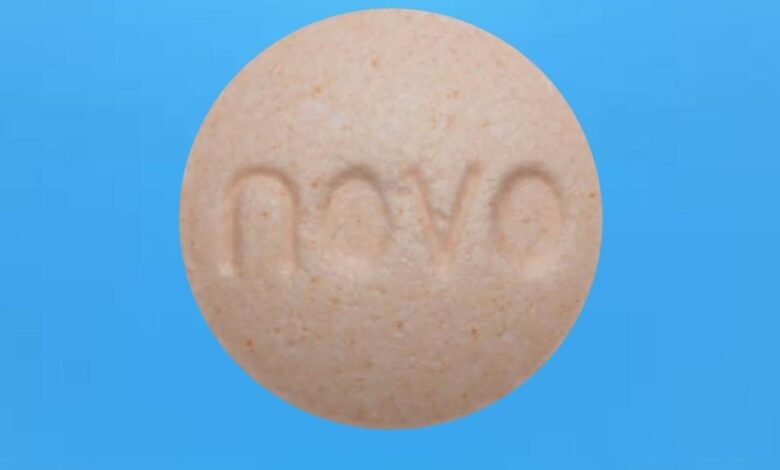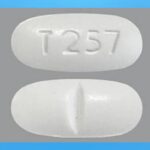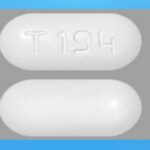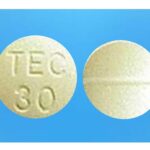Novo 50 Pill: Uses, Dosage, Side Effects, Addiction

Novo 50 pill is a brand of trazodone, a prescription medication approved for use by the Food and Drug Administration (FDA) as an antidepressant. Each round, light orange, coated tablet marked with “50” above the tablet scoreline on one side and “Novo” on the other contains 50 mg of trazodone.
This medicine works in multiple ways in your body. One of its actions is to regulate the neurotransmitter serotonin, which helps brain cells communicate with each other and influences many activities such as sleep, thoughts, mood, appetite, and behavior.
Even at lower doses, Novo pill can cause you to feel relaxed, tired, and sleepy. It does this by blocking chemicals in the brain that interact with serotonin and other neurotransmitters, such as, 5-HT2A, alpha1 adrenergic receptors, and H1 histamine receptors. This effect may be one of the main reasons trazodone works as a sleep aid.
Your doctor may have suggested this medication for conditions other than those listed in these drug information articles. If you have not discussed this with your doctor or are not sure why you are taking this medication, speak to your doctor. Do not stop taking this medication without consulting your doctor.
What are the advantages of Novo Pills for sleep?
Experts recommend cognitive behavioral therapy and other behavioral modifications as the first treatment for insomnia and sleep problems.
If these treatment options are not effective for you, your doctor may prescribe trazodone for sleep. Your doctor may also prescribe it if other sleep medications, such as Xanax, Valium, Ativan, and others (short- to medium-acting benzodiazepine medications), haven’t worked for you.
A few advantages of Novo 50 trazodone pill include:
- Effective treatment for insomnia. A 2017 review of studies of trazodone use for insomnia found the medication was effective for primary and secondary insomnia in low doses.
- Reduced cost. Trazodone is less expensive than some newer insomnia medicines because it is available generically.
- Not addictive. Compared to other medications, such as the benzodiazepine class of medications like Valium and Xanax, trazodone is not addictive.
- May help prevent age-related mental decline. Trazodone might help improve slow wave sleep. This may slow certain types of age-related mental decline like memory in older adults.
- May be a better choice if you have sleep apnea. Some sleep medications may negatively affect obstructive sleep apnea and sleep arousal. A small 2014 study found that 100mg of trazodone had a positive impact on sleep arousal.
Top of Form
How should I use this medication?
The recommended adult dose of trazodone ranges from 150 mg to 300 mg daily, taken in 2 or 3 divided doses with a meal or light snack.
The dose is usually started at 150 mg to 200 mg daily and increased gradually until the best dose is found.
Many things can affect the dose of a medication that a person needs, such as body weight, other medical conditions, and other medications. If your doctor has recommended a dose different from the ones listed here, do not change the way that you are taking the medication without consulting your doctor.
It is important that this medication be taken exactly as prescribed by your doctor. If you miss a dose, take it as soon as possible. If it is almost time for the next dose, skip the missed dose and continue with your regular dosing schedule. Do not take a double dose to make up for a missed one. If you are not sure what to do after missing a dose, contact your doctor or pharmacist for advice.
Store this medication at room temperature, protect it from light and moisture, and keep it out of the reach of children.
Do not dispose of medications in wastewater (e.g. down the sink or in the toilet) or in household garbage. Ask your pharmacist how to dispose of medications that are no longer needed or have expired.
Who should NOT take this medication?
Do not take this medication if you are allergic to trazodone or any ingredients of the medication.
What side effects are possible with this medication?
Many medications can cause side effects. A side effect is an unwanted response to a medication when it is taken in normal doses. Side effects can be mild or severe, temporary or permanent.
The side effects listed below are not experienced by everyone who takes this medication. If you are concerned about side effects, discuss the risks and benefits of this medication with your doctor.
The following side effects have been reported by at least 1% of people taking this medication. Many of these side effects can be managed, and some may go away on their own over time.
Contact your doctor if you experience these side effects and they are severe or bothersome. Your pharmacist may be able to advise you on managing side effects.
• constipation
• decreased sexual desire or ability
• diarrhea
• dizziness or lightheadedness
• drowsiness
• dry mouth
• fatigue
• headache
• nausea
• nervousness
• vomiting
• weakness
Although most of these side effects listed below don’t happen very often, they could lead to serious problems if you do not seek medical attention.
Check with your doctor as soon as possible if any of the following side effects occur:
• blurred vision
• breast enlargement (for men)
• breast leakage of milk (for women, even if not pregnant)
• changes in menstrual cycle
• confusion
• dizziness when rising from a sitting or lying position
• new or worsened emotional problems
• signs of clotting problems (e.g., unusual nosebleeds, bruising, blood in urine, coughing blood, bleeding gums, cuts that don’t stop bleeding)
• symptoms of glaucoma (e.g., blurred vision, seeing halos of bright colours around lights, red eyes, increased pressure in your eyes, eye pain or discomfort)
• symptoms of low sodium levels in the blood (e.g., achy, stiff or uncoordinated muscles; confusion; tiredness; weakness)
• symptoms of mania (e.g., elevated or irritable mood, reduced need for sleep, racing thoughts)
• vision changes
Stop taking the medication and seek immediate medical attention if any of the following occur:
• painful, prolonged erection of the penis (lasting more than 4 hours)
• seizures
• symptoms of a serious allergic reaction (swelling of the face or throat, difficulty breathing, wheezing, or itchy skin rash)
• symptoms of serotonin syndrome (e.g., confusion, fast heartbeat, hallucinations, restlessness, shaking, shivering, sudden jerking of muscles, sweating)
• signs of bleeding in the stomach (e.g., bloody, black, or tarry stools; spitting up of blood; vomiting blood or material that looks like coffee grounds)
• thoughts of self-harm or suicide
Some people may experience side effects other than those listed. Check with your doctor if you notice any symptom that worries you while you are taking this medication.
Are there any other precautions or warnings for this medication?
Before you begin using a medication, be sure to inform your doctor of any medical conditions or allergies you may have, any medications you are taking, whether you are pregnant or breast-feeding, and any other significant facts about your health. These factors may affect how you should use this medication.
Alcohol and other medications that cause drowsiness: Do not combine this medication with alcohol or other medications (e.g., antidepressants, sleeping pills, anxiety medications) that cause drowsiness since additional drowsiness can occur and be dangerous.
Behaviour changes and suicidal thoughts: This medication may worsen symptoms of depression, including thoughts of suicide or wanting to harm themselves or others. It may also cause agitated or aggressive behaviour. If you experience these symptoms or any other behaviour change while taking this medication, contact your doctor immediately. Family members or caregivers of people who are taking this medication should contact the person’s doctor immediately if they notice unusual behaviour changes.
Bleeding: Trazodone may cause a reduced number of platelets in the blood, which can make it difficult to stop cuts from bleeding. If you notice any signs of bleeding, such as frequent nosebleeds, unexplained bruising, or black and tarry stools, notify your doctor as soon as possible. Your doctor will order routine blood tests to make sure potential problems are caught early.
Blood pressure: Trazodone may cause low blood pressure and possibly cause a feeling of lightheadedness when moving from a sitting or lying position to a standing position.
Dizziness: Trazodone can cause severe dizziness, especially when rising from a sitting or lying position. People taking medications that can cause dizziness should rise slowly from sitting or lying down to reduce the possibility of severe dizziness or fainting.
Drowsiness/reduced alertness: Trazodone may impair the mental or physical abilities required for potentially hazardous tasks, such as driving or operating machinery. Avoid driving, operating machinery, or performing other hazardous tasks until you have determined how this medication affects you.
Glaucoma: Trazodone may worsen symptoms of glaucoma (increased pressure in the eyes), such as blurred vision or eye pain or pressure. If you have glaucoma, discuss with your doctor how this medication may affect your medical condition, how your medical condition may affect the dosing and effectiveness of this medication, and whether any special monitoring is needed.
Heart rhythm: Trazodone can cause changes to the normal rhythm of the heart, including an irregular heartbeat called QT prolongation. QT prolongation is a serious life-threatening condition that can cause fainting, seizures, and sudden death. If you are at risk for heart rhythm problems (e.g., people with heart failure, angina, low potassium or magnesium levels), discuss with your doctor how this medication may affect your medical condition, how your medical condition may affect the dosing and effectiveness of this medication, and whether any special monitoring is needed.
Priapism: Trazodone has been associated with prolonged or inappropriate erections (priapism) for a number of men taking this medication. If this occurs, stop taking the medication immediately and contact your doctor.
Seizures: Seizures have been reported for a small number of people taking trazodone. Most of these people were already taking medications for a previously diagnosed seizure disorder. If you have a history of seizures, discuss with your doctor how this medication may affect your medical condition, how your medical condition may affect the dosing and effectiveness of this medication, and whether any special monitoring is needed.
Serotonin syndrome: Rarely, severe, life-threatening reactions are possible when trazodone is combined with other medications that act on serotonin, such as tricyclic antidepressants and serotonin reuptake inhibitors, which are other medications used to treat depression. This is called serotonin syndrome. These combinations should be avoided. Symptoms of a reaction may include muscle rigidity and spasms, difficulty moving, changes in mental state including delirium and agitation. Coma and death are possible.
Stopping the medication: If this medication needs to be stopped, it should be done gradually, under the supervision of your doctor. Suddenly stopping trazodone can cause anxiety, agitation, or sleep problems.
Pregnancy: The safety of trazodone for use during pregnancy has not been established. It should not be used by women who may become pregnant unless, in the opinion of their doctor, the expected benefits outweigh the potential risks. If you are or may be pregnant, talk to your doctor about the risks and benefits of this medication.
Breast-feeding: This medication may pass into breast milk. If you are breast-feeding and are taking trazodone, it may affect your baby. Talk to your doctor about whether you should continue breast-feeding.
Children and adolescents: The safety and effectiveness of trazodone have not been established for people less than 18 years of age.
Seniors: People over the age of 65 years may be more at risk of side effects from this medication and may require lower treatment doses.
What other drugs could interact with this medication?
There may be an interaction between trazodone and any of the following:
• alcohol
• antiarrhythmic medications (e.g., amiodarone, disopyramide, procainamide, sotalol, quinidine, flecainide)
• antihistamines (e.g., cetirizine, doxylamine, diphenhydramine, hydroxyzine, loratadine, olopatadine, rupatadine)
• anti-Parkinson’s medications (e.g., bromocriptine, entacapone, pramipexole, rasagiline, safinamide, selegiline)
• amphetamines (e.g., dextroamphetamine, lisdexamfetamine)
• antipsychotics (e.g., chlorpromazine, clozapine, haloperidol, olanzapine, quetiapine, risperidone)
• apalutamide
• aprepitant
• azelastine
• “azole” antifungals (e.g., itraconazole, ketoconazole, posaconazole, voriconazole)
• benzodiazepines (e.g., alprazolam, diazepam, lorazepam)
• bosentan
• brimonidine
• buprenorphine
• buspirone
• butorphanol
• cabergoline
• cannabis
• chloral hydrate
• clonidine
• cobicistat
• conivaptan
• deferasirox
• dexmethylphenidate
• dextromethorphan
• diltiazem
• elagolix
• enzalutamide
• ergotamine-like medications (e.g., dihydroergotamine, ergotamine, methylergonovine)
• esketamine
• flibanserin
• grapefruit juice
• HIV non-nucleoside reverse transcriptase inhibitors (NNRTIs; e.g., efavirenz, etravirine, nevirapine)
• HIV protease inhibitors (e.g., atazanavir, indinavir, ritonavir, saquinavir)
• lemborexant
• linezolid
• lithium
• lumacaftor and ivacaftor
• macrolide antibiotics (e.g., clarithromycin, erythromycin)
• methadone
• methylene blue
• methylphenidate
• metoclopramide
• mifepristone
• mirtazapine
• mitotane
• modafinil
• monoamine oxidase inhibitors (MAOIs; e.g., moclobemide, phenelzine, tranylcypromine) muscle relaxants (e.g., baclofen, cyclobenzaprine, methocarbamol, tizanidine)
• opioid pain medications (e.g., codeine, morphine)
• ozanimod
• pomalidomide
• protein kinase inhibitors (e.g., dasatinib, imatinib, lapatinib, pazopanib, sunitinib)
• quinine
• rifabutin
• rifampin
• ropinirole
• rotigotine
• St. John’s wort
• sarilumab
• scopolamine
• seizure medications (e.g., clobazam, gabapentin, levetiracetam, phenobarbital, phenytoin, primidone, topiramate, valproic acid, zonisamide)
• selective serotonin reuptake inhibitors (SSRIs; e.g., citalopram, fluoxetine, paroxetine, sertraline)
• serotonin antagonists (anti-emetic medications; e.g., granisetron, ondansetron)
• serotonin/norepinephrine reuptake inhibitors (SNRIs; e.g., desvenlafaxine, duloxetine, levomilnacipran, venlafaxine)
• siltuximab
• tapentadol
• tetrabenazine
• tocilizumab
• tramadol
• tricyclic antidepressants (e.g., amitriptyline, desipramine, trimipramine)
• “triptan” migraine medications (e.g., sumatriptan, zolmitriptan)
• tryptophan
• verapamil
• warfarin
• zolpidem
• zopiclone
If you are taking any of these medications, speak with your doctor or pharmacist. Depending on your specific circumstances, your doctor may want you to:
• stop taking one of the medications,
• change one of the medications to another,
• change how you are taking one or both of the medications, or
• leave everything as is.
An interaction between two medications does not always mean that you must stop taking one of them. Speak to your doctor about how any drug interactions are being managed or should be managed.
Medications other than those listed above may interact with this medication. Tell your doctor or prescriber about all prescription, over-the-counter (non-prescription), and herbal medications you are taking. Also tell them about any supplements you take. Since caffeine, alcohol, the nicotine from cigarettes, or street drugs can affect the action of many medications, you should let your prescriber know if you use them.
Novo 50 pill Dependence and Addiction
Novo 50 pill is a long-term medication and, although it is not inherently dangerous to take for months or years, it can still cause dependence. If a person needs to take Trazodone in order to feel normal or, if they feel withdrawal symptoms without it, they have become dependent. Whether or not antidepressants are addictive is up for debate since people do not typically crave these drugs.
Regardless, people who stop taking Novo 50 pill suddenly may experience uncomfortable withdrawal symptoms. Patients who no longer want to take this medication should talk to a healthcare provider about tapering off until it is safe to completely end treatment.
In order to avoid the experience of withdrawal symptoms, a person may continue to use Novo 50 pill even if it is no longer needed. In extreme cases, those with a dependency or addiction will visit different doctors for more prescriptions or purchase it illegally.





